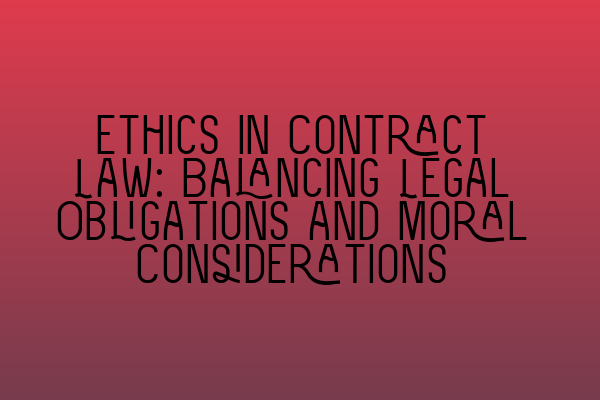Ethics in Contract Law: Balancing Legal Obligations and Moral Considerations
Contract law forms the foundation of business transactions and legal relationships. It provides a framework to govern the enforceability of agreements and the rights and responsibilities of parties involved. While the law serves as the governing force in contract formation and performance, it is essential to consider the ethical implications that arise when entering into contractual obligations.
Understanding the Legal Framework
Before delving into the ethical considerations surrounding contract law, it is crucial to understand the legal framework that governs this area. In contract law, an agreement is considered legally binding when all the essential elements of a contract are present. These elements include an offer, acceptance, consideration, legality, capacity, and intention to create legal relations.
Once a contract is formed, it becomes a legally enforceable document, and breaching the terms of the contract can lead to legal consequences. However, there are instances where legal obligations clash with moral considerations, leading to ethical dilemmas.
The Role of Ethics in Contract Law
Ethics in contract law are concerned with the morality of contractual agreements and the fairness of their terms. While the law primarily focuses on upholding the parties’ legal rights, ethical considerations examine whether the terms of the contract are morally just and fair to all parties involved.
For example, a contract may be legally valid, but its terms may exploit one party or create unfair advantages. In such cases, ethical concerns arise, challenging the balance between legal obligations and moral considerations. It is essential for legal professionals to approach these dilemmas with thoughtfulness and conscientiousness.
Conflicts between Legal Obligations and Moral Considerations
There are several scenarios where conflicts between legal obligations and moral considerations may arise in contract law:
- Unconscionable Contracts: Unconscionability refers to contracts that are so harsh or one-sided that they shock the conscience. While the law may recognize such contracts as valid, ethical considerations question their fairness and may lead to legal remedies or avoidance of enforcement.
- Implied Duties of Good Faith: While not explicitly stated in all contracts, there is an implied duty of good faith and fair dealing. This duty assumes that parties will act honestly and fairly throughout the contract’s performance. Breaching this duty raises ethical concerns and may, in some cases, give rise to legal remedies.
- Exploitative Terms and Conditions: Contracts that contain exploitative or oppressive terms and conditions may be legally enforceable but may create ethical dilemmas. It is the responsibility of legal professionals to review such terms and advise their clients accordingly.
Striking a Balance
When faced with ethical dilemmas in contract law, legal professionals must strive to strike a balance that satisfies both legal obligations and moral considerations. This involves careful analysis, considering the relevant laws, legal precedents, and ethical frameworks.
It is vital for legal practitioners to assess whether a contract’s terms are in line with societal values, fairness, and justice. They should provide transparent and ethical advice to their clients, guiding them towards contracts that are not only legally valid but also morally acceptable.
Conclusion
Ethics play a crucial role in contract law. While the law sets the parameters for enforceable contracts, ethical considerations ensure that the terms of those contracts are just and fair. Legal professionals must navigate the intersection of legal obligations and moral considerations to guide their clients towards ethically sound agreements.
If you found this article helpful, you may also be interested in the following related articles:
